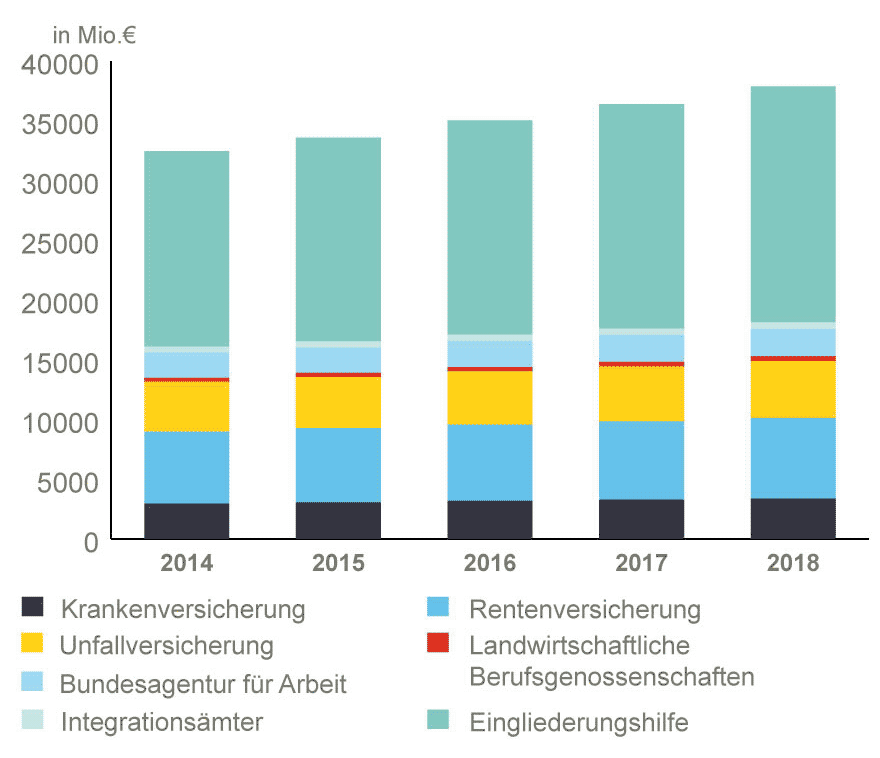Rehabilitation contributes to securing skilled labour
Rehabilitation is an elementary component of the German welfare state. It helps to (re)enable people with disabilities and health restrictions to earn a living by using their own labour. An economically independent and self-determined life thus remains possible. Successful rehabilitation services can and must make an even greater contribution in future to securing the supply of labour and skilled workers in Germany and extending the actual working life.

©AdobeStock j-mel
Against the backdrop of demographic developments and the shortages of skilled workers that already exist today and will continue to worsen, companies cannot afford to do without their employees for longer than necessary after an illness. The Corona crisis has not fundamentally changed this. Rather, it is in companies' own interest to promote and maintain their employees' ability to work and to retain existing knowledge and experience for the company through reintegration. But also the better development of the potentials of as a whole by (re-)integration into jobs of the first labour market is of increasing importance for the companies. In this way, skilled workers can be retained and vacancies filled.
Medical and vocational rehabilitation measures will gain in importance in the coming years. The rehabilitation system must therefore be made more efficient and effective. Self-government in the social insurance system is very important in this context. Successful rehabilitation services that are geared to effectiveness and economic efficiency help to increase the supply of labour and skilled workers in Germany and to extend working life. They are also crucial to enabling individuals to participate in the world of work and society. Last but not least, they are essential in order not to place an additional and unnecessary burden on the social security systems and to make them fit for the future.
Rehab processes must be improved
In principle, the resources available in the rehabilitation system are limited. At the same time, expenditure on rehabilitation services has risen steadily in recent years. Whereas in 2006 around €25 billion was spent on rehabilitation and participation in total, in 2018 this figure had already risen to over €38 billion. It is therefore crucial to align the use of funding instruments with the principles of impact and cost-effectiveness.
In April 2019, the BDA made the following recommendations for better and more successful rehabilitation: rehabilitation needs must be identified earlier and prompt care must be ensured, interface problems must be solved, and cooperation between providers must be further improved. In addition, it is necessary to create transparency about the rehabilitation process. Therefore, the new participation procedure report must be meaningful. Employers still lack a , which guides them through the rehabilitation jungle. Medical and vocational rehabilitation must be coordinated in the best possible way. Since 40% of recipients of basic social security benefits under SGB II are estimated to have serious health restrictions, rehabilitation must be given much greater priority in SGB II. The principle of outpatient before inpatient must be implemented consistently, the offers of the vocational promotion centres must be designed to be even more company-oriented, and the economic efficiency of the providers' own rehabilitation facilities must be ensured.
Participation procedure report creates important transparency.
The , which is to be compiled annually by the Federal Working Group for Rehabilitation (BAR) as a result of the Federal Partial Participation Act, finally creates transparency about the cooperation between the rehabilitation providers and the rehabilitation services provided. Better recognition of divergences and intransparencies in rehabilitation law that hinder procedures is central to improvements in a rehabilitation system that is divided into several providers.
Personal provision and occupational prevention must play an important role
Through prevention and improved private and occupational health care, cases of rehabilitation should ideally be avoided in the first place. Each and every individual should contribute to avoiding incapacity to work due to illness or damage to health. German companies can already look back on a long tradition in occupational health and safety as well as in the area of healthy and performance-promoting working conditions. They make a significant contribution to prevention through successful occupational health and safety and a wide range of workplace health promotion measures.
PDFs and links on the topic
Facts and figures
Total expenditure and shares of the executing agencies 2014-2018, source: https://www.bar-frankfurt.de/service/reha-info-und-newsletter/reha-info-2020/reha-info-012020/traegeruebergreifende-ausgabenstatistik-der-bar.html








